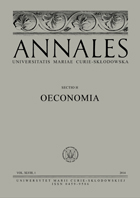Does Organizational Support Really Influence Satisfaction and Well-Being During Enforced Working from Home?
Does Organizational Support Really Influence Satisfaction and Well-Being During Enforced Working from Home?
Author(s): Marcin Butlewski, Wiktoria Czernecka, Piotr Janiszewski, Joanna Bogajewska-Danek, Brigita Gajšek, MARCIN SUSZYŃSKI, JINAL PARIKHSubject(s): Business Economy / Management, Human Resources in Economy, Socio-Economic Research
Published by: Wydawnictwo Naukowe Uniwersytetu Marii Curie-Sklodowskiej
Keywords: well-being; organizational support; ergonomics;
Summary/Abstract: Theoretical background: The transition to enforced working from home (EWfH) due to the COVID-19 pandemic has dramatically altered work dynamics, necessitating a reevaluation of traditional labor rela- tions and service delivery. This shift underscores the need for comprehensive organizational support, with theoretical frameworks like the job demands-resources (JD-R) model and work-life boundary management theory highlighting the impact of remote work on employee well-being, productivity, and job satisfaction. These frameworks suggest that well-being is influenced by the balance between job demands and resources, and how individuals manage work-life boundaries, laying the groundwork for exploring how organizational support can address EWfH challenges.Purpose of the article: This article aims to delve into organizational support during EWfH and its impact on employee well-being. It focuses on identifying critical support aspects and their influence on subjective well-being, providing insights into effective remote work practices and guiding organizations in supporting their workforce post-pandemic.Research methods: Employing a mixed-methods approach, the study surveyed 429 Polish employees across different sectors, complemented by qualitative interviews for deeper insight. This methodology enabled the collection of comprehensive data on employer support perceptions and their impact on remote working well-being, analyzed through statistical and thematic analysis methods. Main findings: Key findings underscore the importance of effective communication, resource access, well-being support, and career growth opportunities as crucial organizational support aspects for remote employees. A significant correlation was found between organizational support levels and enhanced em- ployee well-being, with higher support linked to reduced stress, improved work-life balance, and increased job satisfaction. The study also emphasizes the need for personalized support strategies, accounting for individual differences and home working environments, to foster a positive remote working experience and ensure long-term productivity and well-being. The main application of your paper, which examines the impact of company policies on employee well-being during EWfH, could be the development of a compre- hensive guide or toolkit for organizations to better support their remote workforce. This application would be particularly relevant to HR departments, managers and organizational leaders.
Journal: Annales Universitatis Mariae Curie-Skłodowska, Sectio H Oeconomia
- Issue Year: LVIII/2024
- Issue No: 3
- Page Range: 203-215
- Page Count: 13
- Language: English

